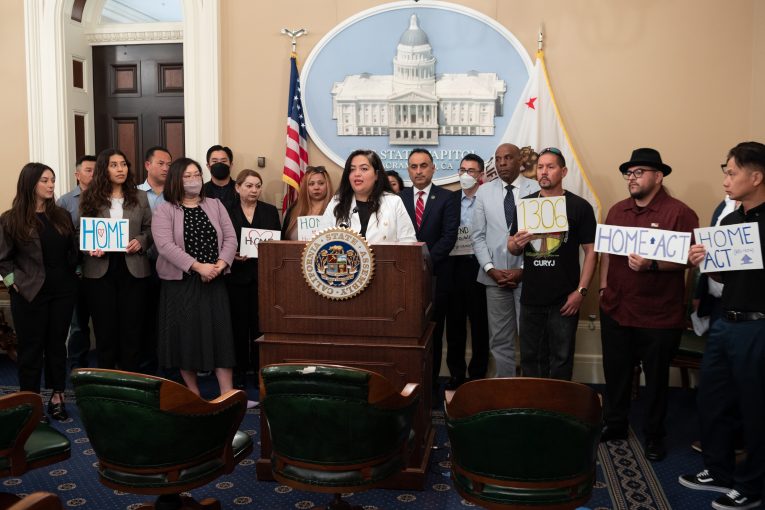

By David M. Greenwald
Executive Editor
Sacramento, CA – On Friday, Governor Newsom announced that he was returning AB 1306, dubbed the HOME Act, without his signature.
AB 1306 would restrict the California Department of Corrections and Rehabilitation (CDCR) from transferring individuals leaving incarceration after achieving parole to Immigration Customs Enforcement (ICE), if they have also benefited from recent resentencing and compassionate release reforms.
Introduced by Assemblymember Wendy Carrillo, the bill’s principal co-authors are Asm. Ash Kalra and Sen. Scott Wiener. Additional co-authors include Assemblymembers Mia Bonta, Isaac Bryan, Matt Haney, Josh Lowenthal, and Damon Connolly and Senator Henry Stern.
The Bill passed the Senate with a 29-vote majority on September 11 and had “no opposition,” providing what Carrillo called “a straightforward solution to align state policy with existing criminal justice reforms that are already law.”
However, in the Governor’s view, “The bill would prevent information sharing and coordination upon a person’s release from CDCR custody for a significant number of people and, as a result, would impede CDCR’s interaction with a federal law enforcement agency charged with assessing public safety risks.”
The Governor said, “I believe current law strikes the right balance on limiting interaction to support community trust and cooperation between law enforcement and local communities. For this reason, I cannot sign this bill.”
“I am disappointed in Governor Newsom’ decision to veto AB 1306, the HOME Act,” Carrillo said in a statement Friday.
She said, “It was never the intention of the legislature to exclude immigrants from restorative justice reform policies.”
Carrillo referenced a recent ACLU public records request that “showed clear bias and discrimination that targeted Latinos and other immigrant individuals by CDCR staff.”
She noted, “The crass reference of putting ‘Mexican’ or ‘US Citizen’ in a hat and picking one to determine an individual’s future, while having documentation that the individual was born in California further signaled the need to put an end to the collaboration with ICE, which allows CDCR to engage in discriminatory judge, jury and executioner tactics.”
Carrillo believed the legislation was a very narrow fix in law, three years in the making, “to ensure the legislature’s intention of allowing uniquely affected Californians to return to their communities and families and rebuild their lives after serving their time.”
Instead, “they will continue facing indefinite incarceration in immigration detention, which is a sentence that was never handed down by a criminal court or a judge. The policy had no opposition, was highly supported by the legislature and additionally, had no opposition from law enforcement.”
She added, “I am committed to re-introducing the policy and ending a dual system of justice in California that treats immigrants as less than and unworthy of a second chance.”
The ICE Out of California Coalition added that the veto was “cruel, callous and cowardly,” and occurred “despite the fact the bill passed both houses of the legislature with supermajority votes and received no organizational opposition whatsoever.”
The group said, “When policy-making is driven by vanity and crass ambition rather than sound judgment, all Californians suffer.
“People across the country from all walks of life are increasingly recognizing that the ‘double-punishment’ of immigrants who have already served their time is deeply unjust. The stories of community members who have faced this double-punishment have inspired an outpouring of public support.”
They added, “The Governor may claim that he supports rehabilitation and second chances. Yet he cannot praise rehabilitation in one breath, but condone the racist targeting of immigrants for detention and deportation in the next.”
The group also noted, “A strong consensus had emerged in favor of the HOME Act, with strong support from over 100 faith, labor, and community organizations and criminal-legal system reform advocates, famed Labor Leader Dolores Huerta and Retired Superior Court Judge LaDoris Cordell.”
Several states, including Oregon, Illinois, and Washington, DC, have already enacted much further-reaching legislation; today’s veto cements California’s retrogression on these issues.
At hearings and press conferences, community members harmed by ICE transfers have shared their stories and underscored the urgency of harmonizing state policy with existing criminal justice reforms which are helping to reduce mass incarceration and address racism in our legal system.
Video of the April press conference where Assemblymember Carrillo unveiled the HOME Act alongside other legislators, advocates, and community members Sandra Castaneda, Tin Nguyen, and Phil Melendez of Smart Justice, is available here.

